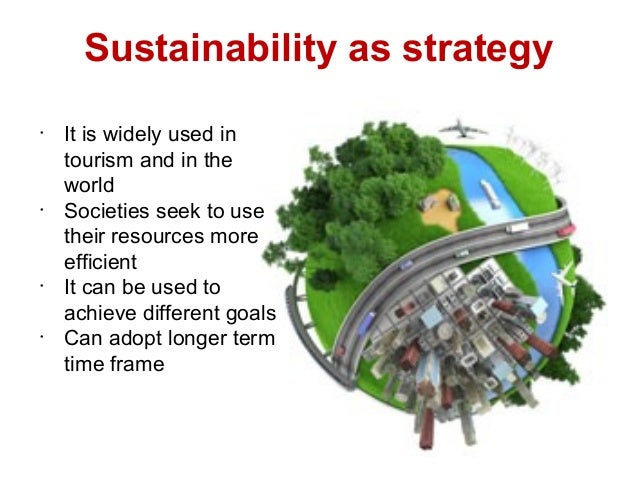Sustainable tourism is a new form of tourism designed to meet the needs of present tourists and host regions while protecting and enhancing opportunity for the future making a low impact on the environment, economy and local culture.
Sustainable tourism plays an important role in conserving biodiversity. It enables local people to protect their natural and cultural resources and profit from them at the same time. This form of tourism attempts to minimize its impact on the environment and local culture so that it will be available for future generations, while contributing to generate income, employment, and the conservation of local ecosystems. It provides local communities with a positive economic incentive for protecting wild habitats: for example preserving an area of natural forest can generate more income from tourism that cutting the trees down for timber.
Guidelines and management practices are applicable to all forms of tourism in all types of destinations, including mass tourism and the various niche tourism segments. This type of tourism changes quickly and so it requires constant monitoring of impacts, introducing the necessary preventive and/or corrective measures whenever necessary.
THE POINT OF VIEW OF ALL INVOLVED ACTORS:
Stakeholders
Stakeholders of sustainable tourism play a role in continuing this form of tourism. There areorganizations that would inspect a tourism product, and certify them as a sustainable company if they follow some international standards.
Governments
One important factor to consider in any ecologically sensitive or remote area or an area new to tourism is that of carrying capacity which enables tourists to have a greater sense of responsibility about the damages they can cause on the environment or culture of the surrounding area. This can be altered and revised in time and with changing perceptions and values.
Non-governmental organizations
Non-governmental organizations are one of the stakeholders in support of sustainable tourism. Large conventions, meetings and other major organized events drive the travel, tourism and hospitality industry. Major sporting events, such as the Olympic Games can bring millions of visitors to the countries where they are held and so they are very important for the tourist industry. Many special events and local festival such as “ Carnival in Rio de Janeiro” have became world famous and are now a major draw for tourists. On the other hand the events bring a lot of negative effects and so some convention centers have begun to take direct action in reducing the impact of the conventions they host.
Local Communities
The sudden arrival of tourist into a remote community can be culturally devastating but sustainable tourists are encouraged to minimize this impact by learning about and respecting local cultural and religious practices by approaching communities in a sensitive way. Local communities benefit from sustainable tourism through:
 - new employment: Sustainable tourism operators commit themselves to creating jobs for local community members
- new employment: Sustainable tourism operators commit themselves to creating jobs for local community members
- economic development
- infrastructure development: robust infrastructures are needed to support the needs of both the tourism industry and the local community
- growth the standard of living in destination communities
TOUR OPERATORS
About the Tour Operators’ Initiative for Sustainable Tourism Development (TOI)has been created to encourage travel companies to make a commitment to sustainable development and to promote sound tourism practices, mainly through:
- implementation of environmental management strategies in operations and at destination
- responsible tourism development and growth with a focus on destination lifecycle
- promotion of responsible travel choices and consumer behaviors
 The Initiative, fully supported by the World Tourism Organization (UNWTO) has been a pioneer in demonstrating that sustainable development guarantees the competitiveness, attractiveness and survival of destinations and the existence of tourism business in the medium- and long-term. Some tour operator have became specialist in this type of travel.
The Initiative, fully supported by the World Tourism Organization (UNWTO) has been a pioneer in demonstrating that sustainable development guarantees the competitiveness, attractiveness and survival of destinations and the existence of tourism business in the medium- and long-term. Some tour operator have became specialist in this type of travel.TOURISTS:
Sustainable tourism is a movement that encourage individual tourists to have a greater sense of responsibility and to be more sensitive to the damage that they can cause to the natural environment and to the local society.
To be a good tourists people should follow some beavers:
- ASK YOUR SELF WHY YOU ARE GOING
- LEARN ABOUT YOUR DESTINATION
- INVESTIGATE THE T.O. BEFORE BOOKING A HOLIDAY
- TAKE NOTHING WITH YOU THAT IS NOT ABSOLUTELY NECESSARY
- CHOOSE THE PRODUCTS YOU TAKE ABROAD CAREFULLY
- DO YOUR BEST TO HELP THE LOCAL ECONOMY
- USE PUBLIC TRANSPORT INSTEAD OF RENTING A CAR
- CHOOSE SOUVENIRS CAREFULLY

- BE SENSITIVE ABOUT LOCAL CUSTOMS
In the end tourists need to remember that when they go abroad they are a guest in a host country.
SITOGRAPHY:
https://www.gdrc.org/uem/eco-tour/sustour-define.html
book: tourism at work, casa editriceeuropass, Kiaran O’Malley



Nessun commento:
Posta un commento